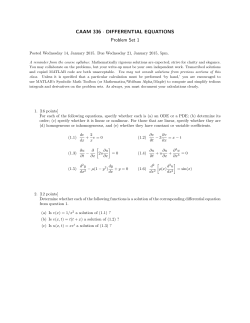
Problem Sheet 1 - Julio C. Andrade
ANALYTIC NUMBER THEORY IN FUNCTION FIELDS TCC 2015 PROBLEM SHEET 1 JULIO ANDRADE 1-) If m ∈ A = Fq [T ], and deg(m) > 0, show that q − 1 | Φ(m). 2-) If q = p is a prime number and P ∈ A is an irreducible, show (Fq [T ]/P 2 A)∗ is cyclic if and only if deg(P ) = 1. 3-) Suppose m ∈ A is monic and that m = m1 m2 is a factorization into two monics which are relatively prime and of positive degree. Show (A/mA)∗ is not cyclic except possibly in the case q = 2 and m1 and m2 have relatively prime degrees. 4-) Assume q 6= 2. Determine all m for which (A/mA)∗ is cyclic (see the proof of Proposition 1.6 in [1]). 5-) Suppose d | q − 1. Show xd ≡ −1(mod P ) is solvable if and only if (−1) q−1 d deg(P ) 6-) Show Q = 1. α∈F∗q α = −1. 7-) Let P ∈ A be a monic irreducible. Show Y f ≡ ±1(mod P ), deg(f )<d f monic where d = deg(P ). Determine the sign on the right-hand side of this congruence. m 8-) For an integer m ≥ 1 define [m] = T q −T . Show that [m] is the product of all monic irreducible polynomials P (T ) such that deg(P ) divides m. 9-) Working in the polynomial ring Fq [u0 , u1 , . . . , un ], define D(u0 , . . . , un ) = j det |uqi |, where i, j = 0, 1, . . . , n. This is called the Moore determinant. Date: April 11, 2015. 1 2 JULIO ANDRADE Show D(u0 , u1 , . . . , un ) = n Y Y Y ··· i=0 ci−1 ∈Fq (ui + ci−1 ui−1 + · · · + c0 u0 ). c0 ∈Fq Hint: Show each factor on the right divides the determinant and then count degrees. 10-) Define Fj = Qj−1 i=0 (T qj i − Tq ) = Qj−1 2 i=0 [j n i − i]q . Show that D(1, T, T , . . . , T ) = n Y Fj . j=0 Hint: Use the fact that D(1, T, T 2 , . . . , T n ) can be viewed as a Vandermonde determinant. 11-) Show that Fj is the product of all monic polynomials in A of degree j. Q Q i 12-) Define Lj = ji=1 (T q − T ) = ji=1 [i]. Use Exercise 8 to prove that Lj is the least common multiple of all monics of degree j. 13-) Show Y (u + f ) = deg(f )<d D(1, T, T 2 , . . . , T d−1 , u) . D(1, T, T 2 , . . . , T d−1 ) 14-) Deduce from Exercise 13 that Y d X (u + f ) = (−1)d−j deg(f )<d j=0 Fd j j Fj Lqd−j uq . 15-) Show that the product of all the non-zero polynomials of degree less than d is equal to (−1)d Fd /Ld . 16-) Prove that u Y deg(f )<d f 6=0 X d u Ld j 1− = (−1)j uq . j q f Fj L j=0 d−j References [1] M. Rosen: Number Theory in Function Fields, Graduate Texts in Mathematics 210, Springer-Verlag, New York (2002). PROBLEM SHEET 1 University of Oxford - Mathematical Institute E-mail address: j.c.andrade.math@gmail.com 3
© Copyright 2025















